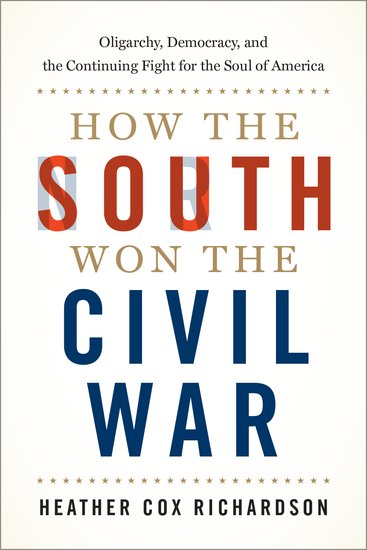According to Richardson, the unending struggle between American democracy and oligarchy began with the birth of the nation. Many historians of early America have argued that the ideology of the American Revolution was democratic republicanism, born during the English Civil War in the 17th century and then embraced by the colonies. As the quintessential radical of the Age of Revolution, Thomas Paine, proclaimed, “The cause of America is in great measure the cause of all mankind.” But not all historians agree that this republicanism was the sole ideology then in circulation in North America. As Edmund Morgan observes in American Slavery, American Freedom, the seeming paradox of American republicanism was the simultaneous emergence of slavery and freedom in the colonial world. From the outset, the American idea of freedom was exclusive: It was for property-owning men only and was based on the enslavement of people of African descent. The Virginian founding fathers solved the problem of inequality by simply enslaving a racially outcast working poor and at the same time elevating the status of all white men, slaveholders and nonslaveholders alike.
For Richardson, the American paradox is a bit different: Slavery and democracy were opposing forces rather than constitutive of each other. She traces the birth of oligarchy, democracy’s enemy, to the ship that brought about 20 enslaved Africans to the British North American mainland in 1619. From then until today, she argues, the history of the United States has been a history of the conflict between democracy and oligarchy. For Morgan, American democracy was based on slavery; for Richardson, though she relies on Morgan’s book, American oligarchy has always rested on combining elite domination with racial and economic inequality. Ever since the arrival of that ship, she maintains, the American republic has allowed its elites to conflate “class and race,” thereby giving them “the language to take over the government and undermine democracy.”
At many points in American history, oligarchy—from the slaveholding elite to the robber barons of the Gilded Age—has had the upper hand. But repeatedly, ordinary Americans, especially those who were disenfranchised, like women and African Americans, have pushed back, leading to the triumph of democracy with slavery’s abolition, women’s suffrage, and the enactment of the New Deal and civil rights legislation. By offering an account of the forces of both democratic progress and oligarchic reaction, Richardson provides historical detail to Corey Robin’s argument in The Reactionary Mind, which traced the antidemocratic origins of American conservatism while offering insight into the democratic forces that resisted it. While Robin situates American conservatism in the longue durée of a Western reactionary philosophical tradition, Richardson locates it in a quintessentially Southern political tradition of oligarchy: anti-statism combined with virulent racism and misogyny. For Robin, too, the proslavery ideology exemplified American conservatism. But for Richardson, after the Civil War, the West and eventually the Republican Party helped reinvent the South’s language of oligarchy with an appeal to individualism that overlays a reactionary commitment to racial hierarchy and opposition to a welfare state.
